Best smart thermostat 2021: ranking the top smart thermostats we’ve tested
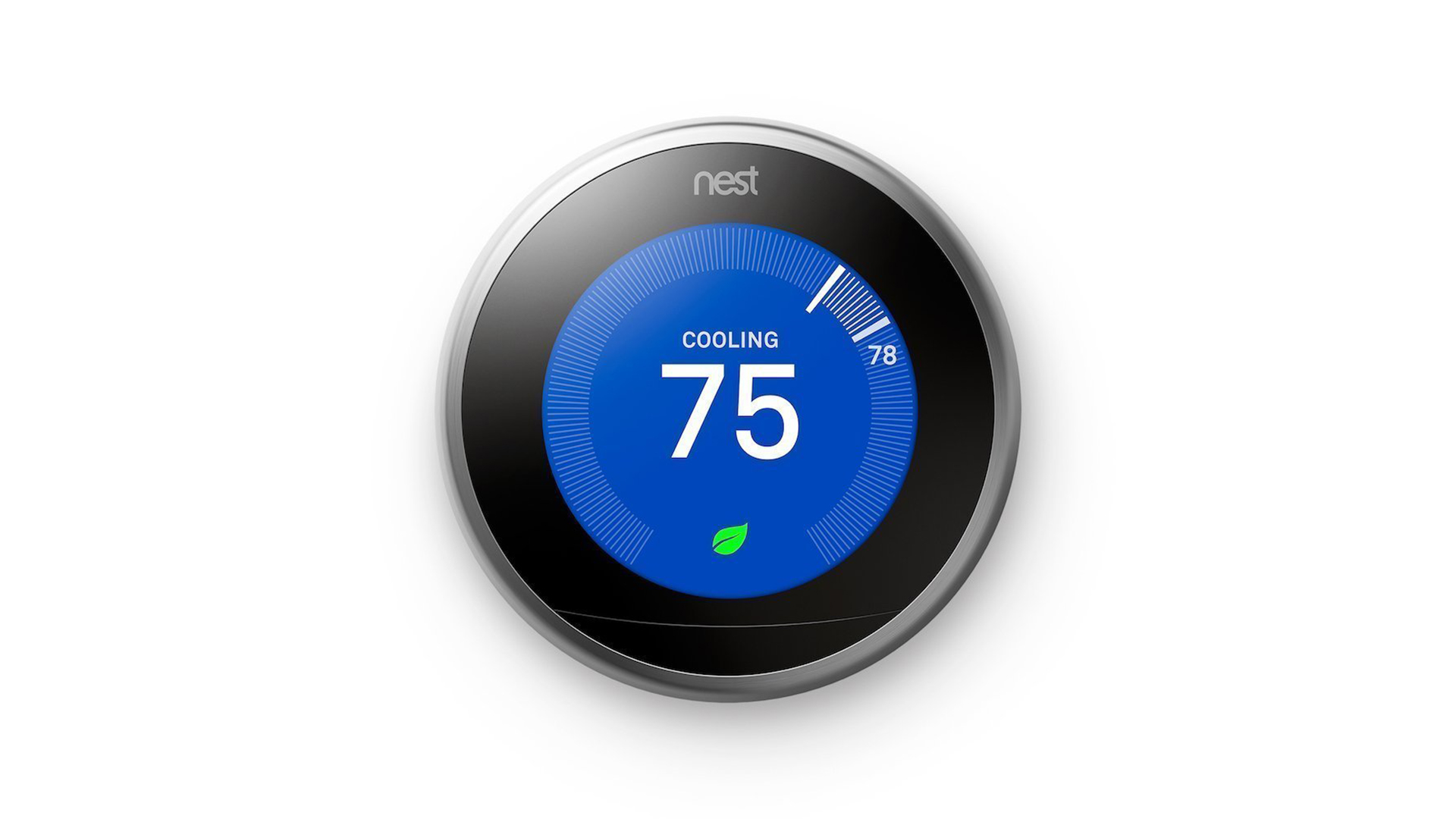
The best smart thermostats make heating and cooling your home so it's the temperature you want, when you want, simple. If you’re going to be late home, you can simply use your smartphone to tweak the schedule for the day - ensuring you don’t waste energy (and money) by heating or cooling an empty home.
Smart thermostats connect your heating and cooling system to the internet, enabling remote control from your smartphone no matter where you are. There are two types to choose from; those that control your heating and cooling system as a whole, and the best smart thermostats from multiple zones , which offer room-by-room temperature control.
Like many of the best smart home devices, most smart thermostats are compatible with Alexa, Google Assistant or Apple’s HomeKit, so you can ask one of the best smart speakers or smart displays to adjust the temperature for you.
Smart thermostats can also be used in wider home automation. For example, you can set the best smart lights and best smart plugs to switch on at the same time as the smart thermostat, if your home security camera or video doorbell has identified you entering your home, creating a cosy atmosphere.
Alternatively ensure when the smart thermostat turns off for the night, the rest of your smart home devices also power down and your smart lock secures your front door - relieving you of having to turn everything off.
There’s a wide range of smart thermostats available from brands including Nest, Tado, Honeywell, and Ecobee, which could leave you hot and bothered when it comes to choosing the best smart thermostat for you. We’ve put some of the most popular models to the test, living with them in our homes to discover just which are the best smart thermostats for 2021.
UPDATE: Ecobee has become one of the first smart home device manufacturers to reveal it’s bringing Siri to its new and existing smart thermostats that offer voice control. An update, which will be made available later this year, will ensure homes with a compatible Ecobee smart thermostat and an Apple HomePod or HomePod Mini in their home, will be able to say “Hey Siri” to their thermostat to get Apple’s voice Assistant to spring into action. Siri on Ecobee will be able to adjust the temperature, set timers, and even offer up personal requests such as checking your calendar entries.
The best smart thermostats 2021: ranked

Nest is one of the biggest names in the smart home market, and for good reason. This Google-owned company delivers well-designed, easy-to-use products that are packed with serious smarts.
The Nest Learning Thermostat (third generation) is renowned for its ability to learn your routines and adjust itself accordingly. This means that over time your heating system can actually adapt to suit your needs, without you having to do anything.
It also benefits from location-based features that track where your phone is, and will turn the heating on or off depending on your location. But don't worry that it's going to turn off the heating and leave your guests to freeze when you're out, as its built-in sensors enable it to detect whether there's anyone at home.
The main criticisms of the Nest Learning Thermostat are that it doesn't offer zonal control, and that if you're a tech novice it can be a little complicated to set up and use. The absence of zonal control means that while you'll be able to digitally control your property as a whole, you'll still have to manually adjust individual radiators.
That said, if you're looking for a top-of-the range system Nest is a good way to go. Plus, with Google behind it, Nest is a good system to invest in if you're planning to build a wider smart home setup.
Read the full review: Nest Learning Thermostat 3rd generation
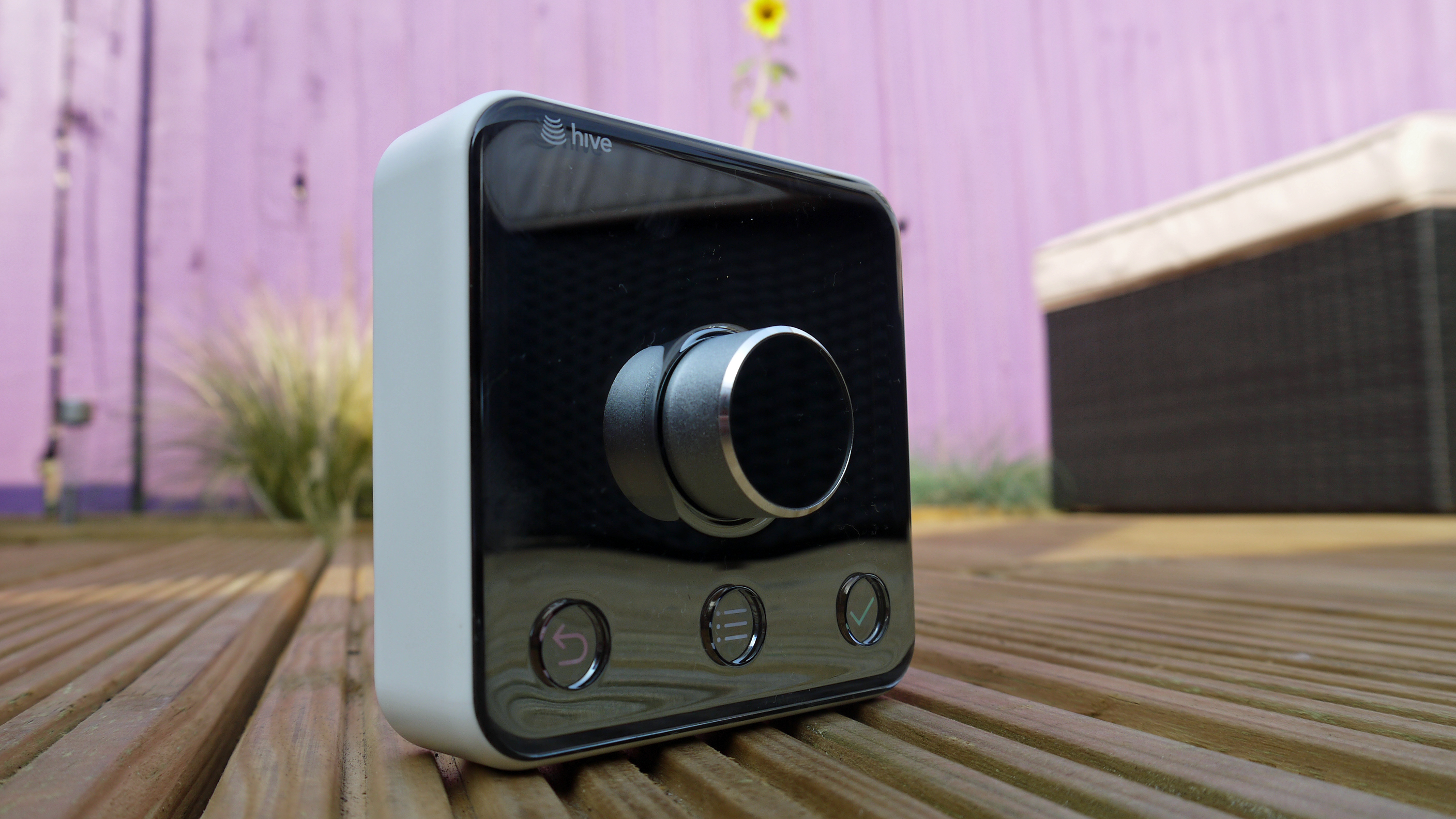
Hive is owned by Centrica, one of the UK's leading energy providers, so you can rest assured that you're in experienced hands when it comes to your heating needs.
The thermostat itself is a collaboration between Hive and Swiss designer Yves Béhar, who's responsible for everything from the August smart lock to PayPal's brand identity. That top-quality styling makes the Hive Active Heating thermostat something you'll be proud to have on your wall.
What's more, Hive has an excellent ecosystem, so you're able to control a vast range of Hive products using a single app. And its thermostat is no slouch, garnering our 'recommended' tag thanks to its simple interface and easy voice assistant integration.
It's worth noting that, like the Nest thermostat above, Hive Active Heating doesn't support Apple's HomeKit, so it's best avoided if you're already invested in Apple's smart home ecosystem.
With a small dial in the middle of its compact design controlling temperature, the Hive Active thermostat gives you the option of keeping things extremely simple, while being packed with features for those who want greater control of their system.
Read the full review: Hive Active Heating 2
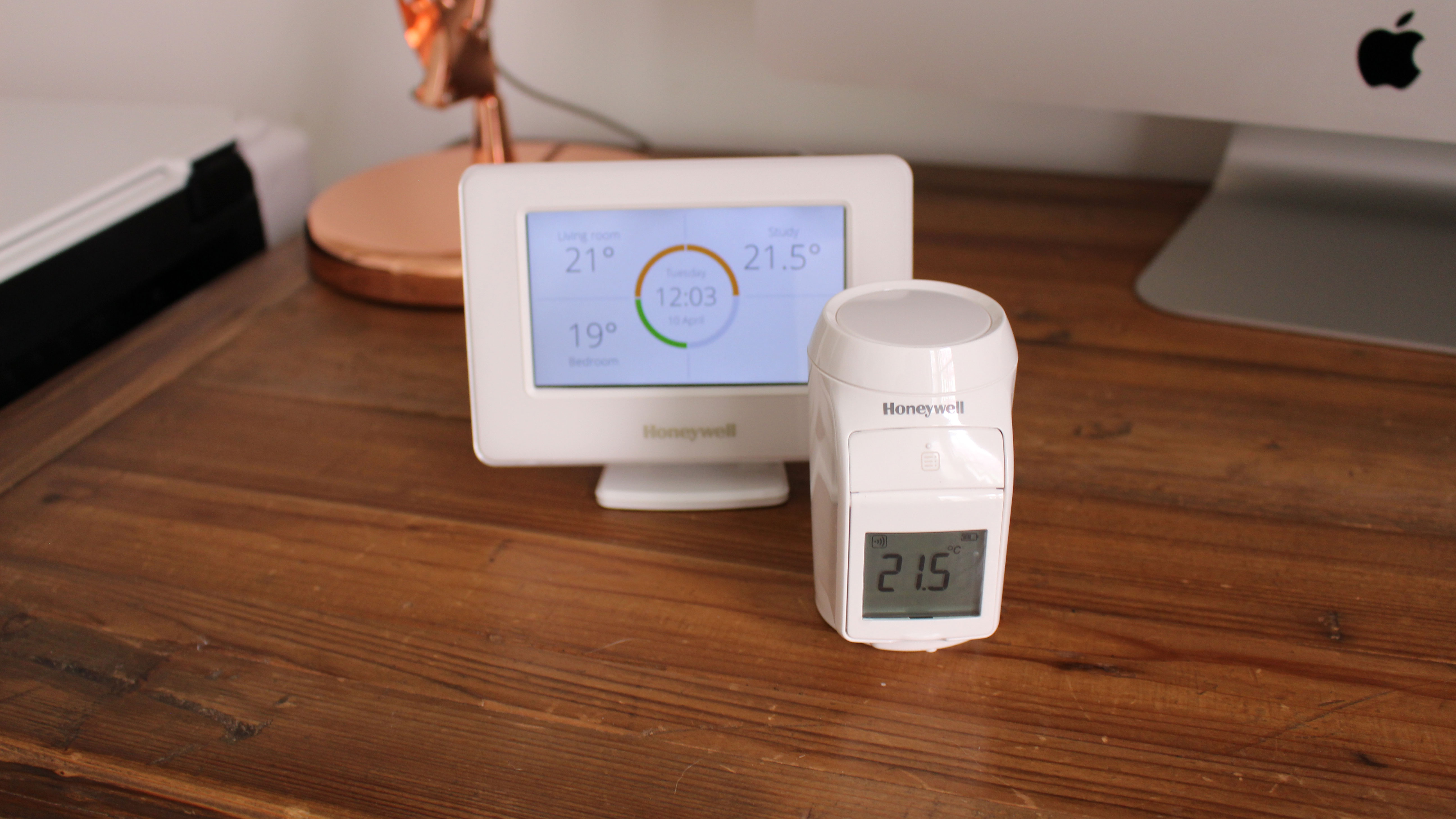
The Honeywell Evohome gives you total control over your home, with individual thermostats for each radiator enabling you to set an independent heating schedule for every room in your house.
It's difficult to grasp what a difference this feature makes until you've tried it for yourself. If you live in a house where different inhabitants prefer a different temperature, or if one room always seems to be hotter or colder than the others, this system is going to be a godsend.
What's more, it works with under-floor heating too, so even if you have a large and complicated heating system the Evohome gives you total control over all of it via an app that's a pleasure to use.
The control panel and radiator thermostats aren't going to win any awards for design, coming as they do in plain white plastic, but that's not really the point of the Evohome. It's a simple system, without the bells and whistles of the Nest or Hive, but if you've got a complicated heating system that you want to control digitally, it's hard to beat.
Read the full review: Honeywell Evohome
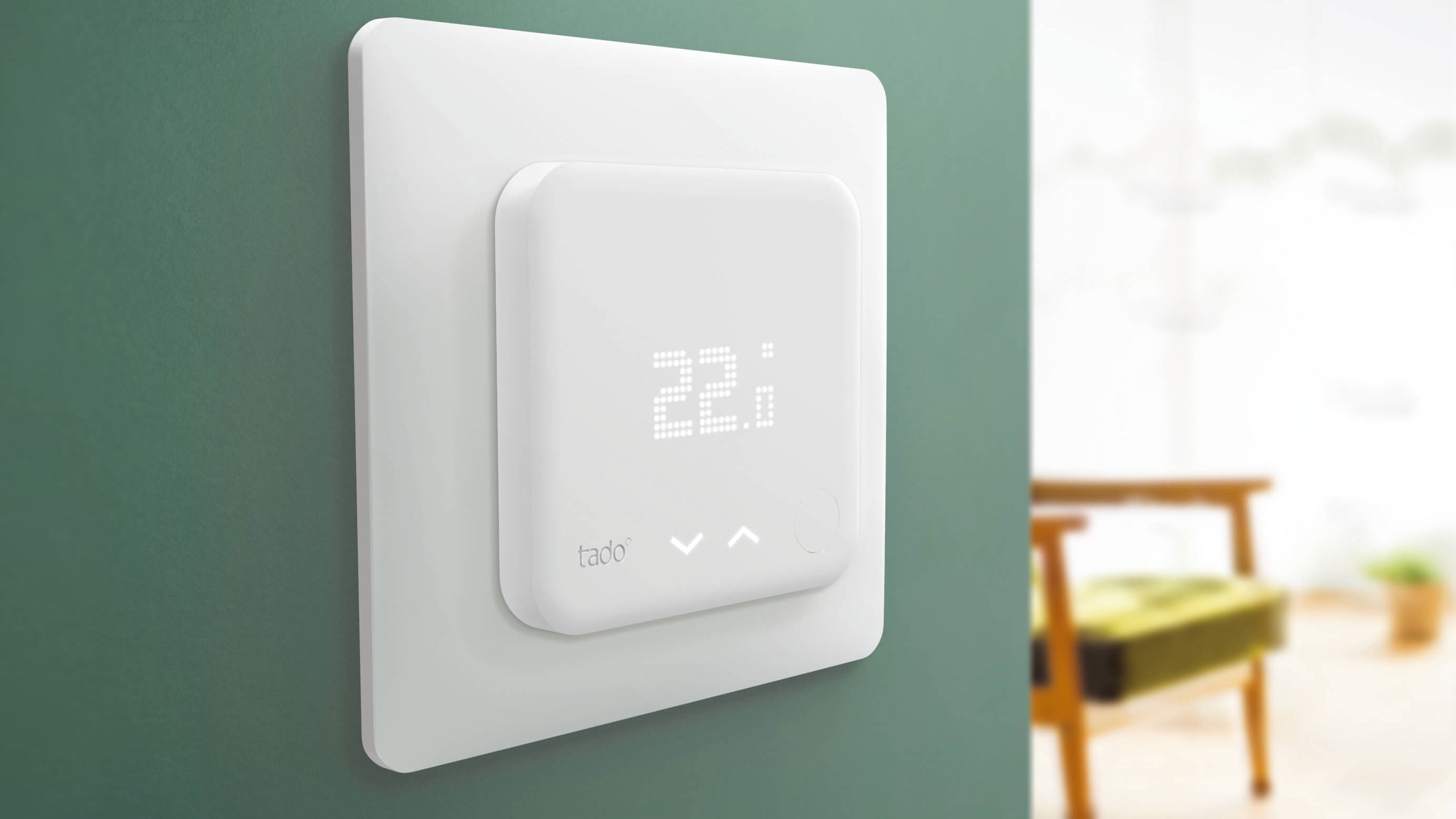
The Tado Smart Thermostat should be brilliant. It offers the zonal control of the Honeywell Evohome, a slick design that rivals the Hive, and the geofencing smarts to match the Nest, but somehow it doesn't quite manage to pull all these features together into a cohesive system.
It's seriously good-looking – by far the most attractive zonal control on the market – but the app is unintuitive to navigate, and compared to the incredibly user-friendly app on the Evohome, it's positively difficult.
That's not to say it's a bad system – it's still comfortably a 4-star product, and we don't imagine anyone who buys the Tado regretting their purchase. And it's so close to being the perfect system – the one that mixes together the best features of other offerings. The problem is, it just doesn't manage to outshine any of its rivals.
One thing that does make the Tado stand out in this list is Apple HomeKit integration – if you're the proud owner of a HomePod, or you're firmly entrenched in the Apple ecosystem, this is probably the best smart thermostat for you.
It's also worth noting that the things keeping Tado from standing out are all software rather than hardware issues, so these could well be addressed over time. The Tado Smart Thermostat isn't currently available in the US, but as Tado's Cooling system is sold there we'd be surprised if it didn't become available at some point.
Read the full review: Tado Smart Thermostat
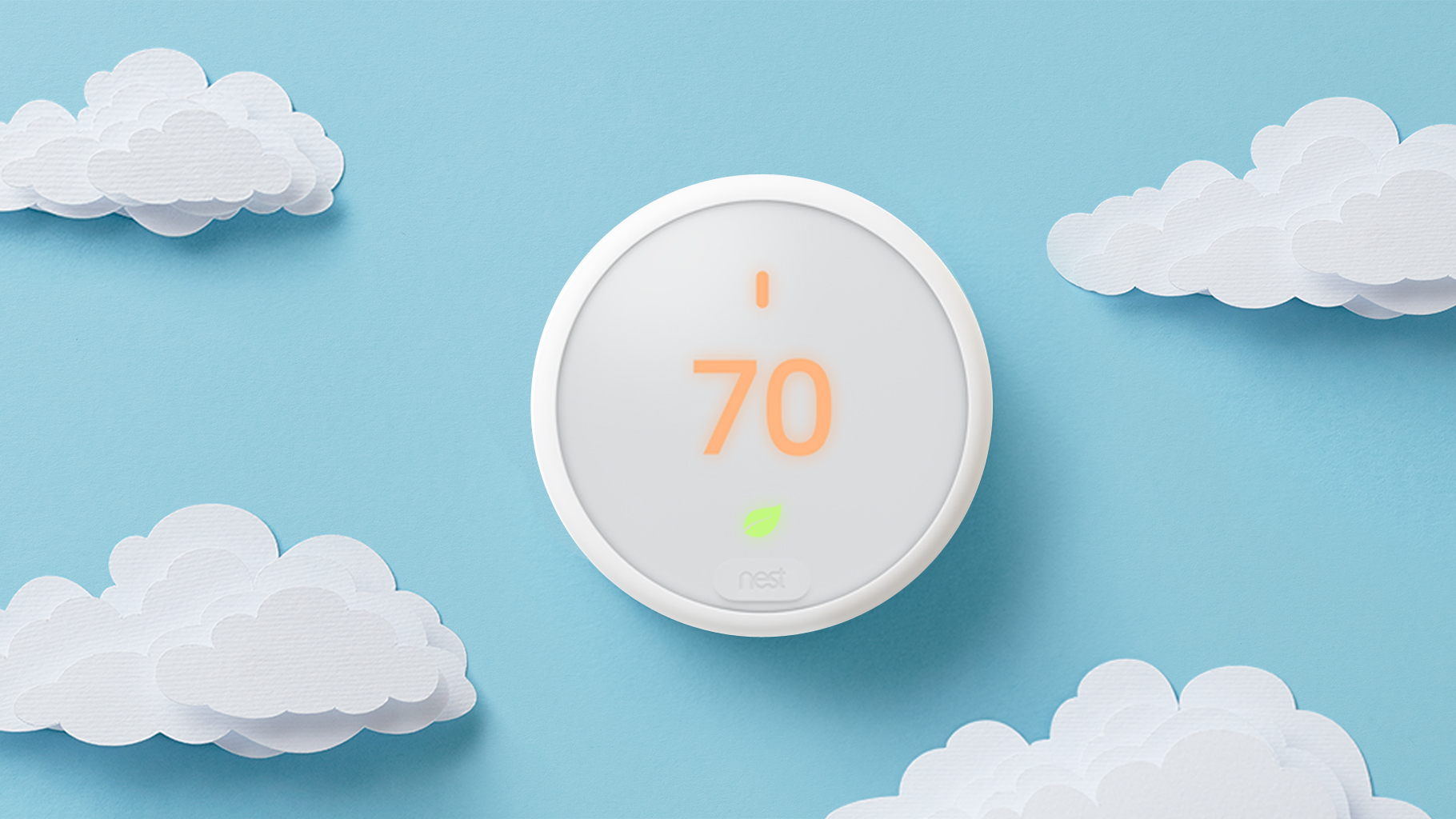
If you like the look of the Nest Learning Thermostat but don't fancy shelling out the money for it, there's a cheaper alternative. It definitely looks cheaper – it's made of white plastic, with a white coating on the plastic screen that can make it hard to see the information being displayed – but it does echo the design language of the original Nest Thermostat, so you'll be more than happy to have it on your wall.
As the Nest's smaller sibling it benefits from industry-leading smarts, lacking only the most advanced features of the premium model which most users are unlikely to take advantage of anyway.
The Nest E is a great example of how to streamline a flagship product to make a cheap alternative without damaging the qualities that made the original great. Make no mistake, this isn't flagship quality for bargain price, but it's great value for what it is.
Read the full review: Nest Thermostat E
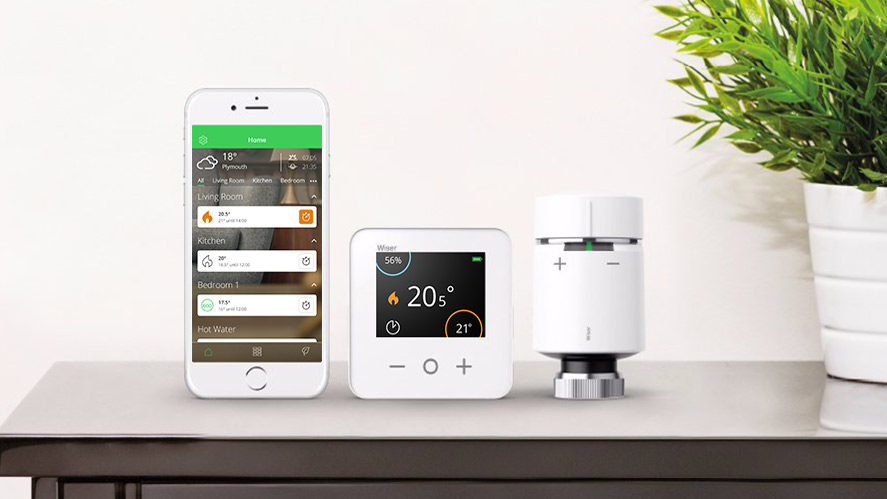
Love the idea of zonal heating control, but you're on a budget? Then Drayton Wiser is worth considering.
The starter kit comes with the boiler module, a room thermostat, and two smart radiator thermostats, which replace any existing TRVs (thermostatic radiator valves) on your radiators, allowing you to control each radiator individually via the Wiser app. You'll need a thermostat for each radiator in your home to get the most out of the system, but as thermostats are around a third cheaper than rival systems from Honeywell and Tado, it makes the overall cost more affordable.
It's simple to use and will switch the boiler on or off earlier than scheduled to ensure rooms in your home are at the temperature you want, when you want them. It's also got Open Window Detection to help stop energy wastage by switching off the boiler if it detects a window has been opened.
However, it's not the most stylish of thermostats on the market, and there's no way to see the temperature of the room from the radiator thermostat itself - you'll need to open the app on your smartphone. That said, it's hard to beat if you're on a budget and want full control over your heating.
Read the full review: Drayton Wiser
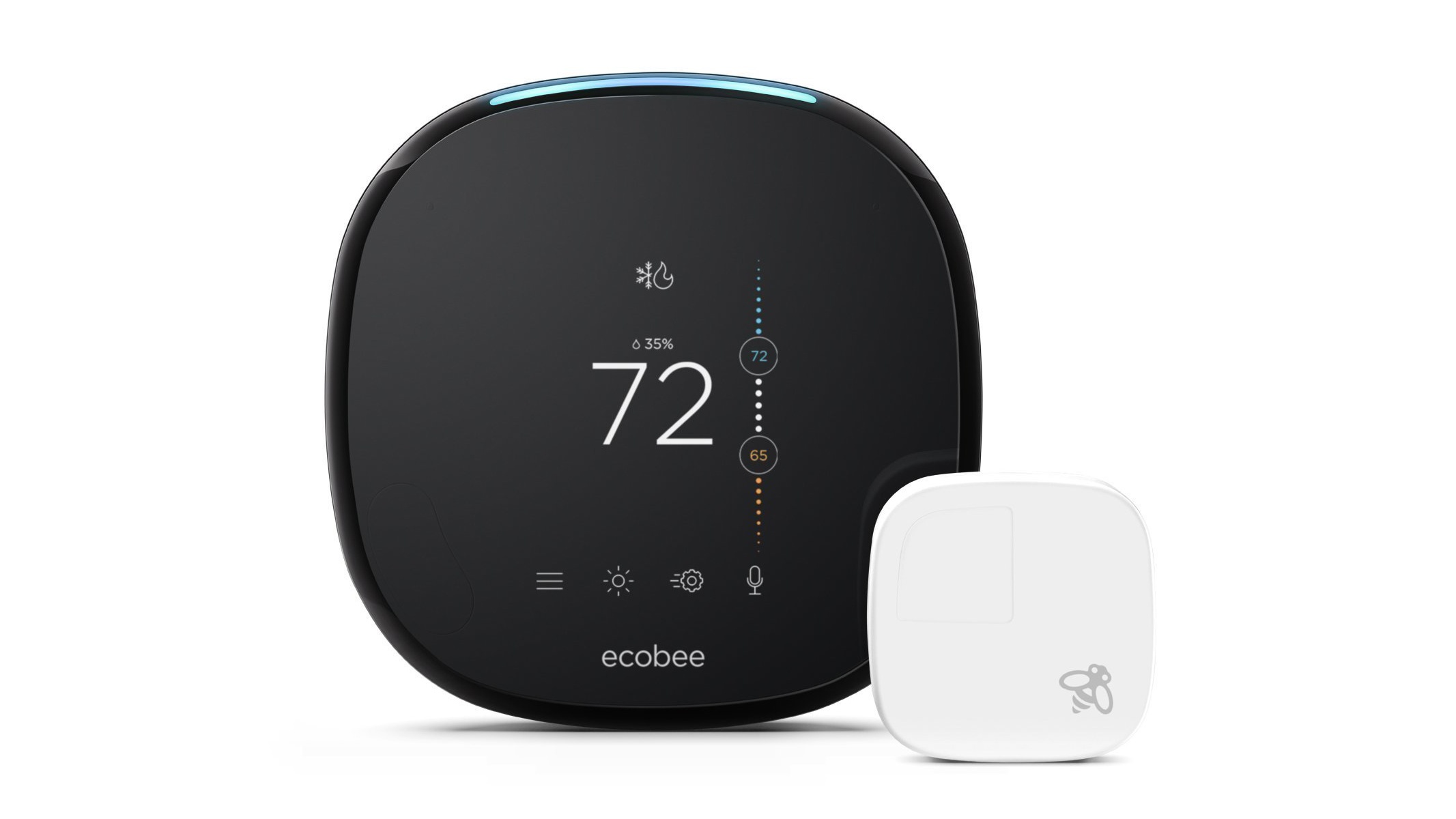
If it's available where you live, the Ecobee4 is well-worth auditioning for your smart home setup. Like other smart thermostats on our list, you can control the Ecobee4 using a smart speaker or smart hub – but, unlike any of the other entries, the Ecobee4 comes with Alexa built right in.
That means, not only is it a great thermostat that can save you bundles on your energy bill each month but it doubles as a conduit to Alexa and its 10,000-strong library of skills. Besides being able to order pizza (yes, really) the Ecobee4 can be controlled wherever you are in the world – should, say, you forgot to turn that thermostat off before your international flight.
While Ecobee may not have the same clout that Nest has garnered in the last few years, it remains one of the best thermostats on the market, bar none.

OK, so not everyone needs another device with Alexa built-in. (We get it, guys, you can build Alexa into anything!) If you're in the camp of people with too many Alexa devices, the Ecobee3 Lite is the perfect solution - it's just the smart thermostat without the smart assistant.
Now, that said, the Ecobee3 is still compatible with all the leading smart home ecosystems. (Ecobee was the first smart thermostat compatible with Alexa, believe it or not.) But if you want the all the extras, like room sensors that can detect temperatures in certain spots in your home, you'll have to buy them separately.
How we test smart therostats
To find out which are the best smart thermostats on the market, we assess how easy they are to install and control. We evaluate how responsive they are when it comes to switching the heating and cooling systems on or off, from a smartphone, both when we’re away from home and close by. We also judge how effectively AI amends the heating and cooling schedule based on how quickly or slowly your house changes temperature, along with any sensors that detect activity (or lack of it) and open windows.
We also appraise each design on how durable it is, and how effectively Alexa, Google Assistant or Siri respond to commands related to the smart thermostat. We also assess any extra kit available for the smart thermostat, such as hubs and radiator valves, and consider whether it requires reading a thick instruction manual before use.
What to consider when buying a smart thermostat
Before selecting the right smart thermostat for you, there are some aspects to consider.
As we’ve already mentioned; there are two types of smart thermostat to consider. Smart thermostats that control your system as a whole are usually more affordable and easier to install than smart thermostats that offer zonal control. However, you may find you’re still heating or cooling rooms that you’re not using, and subsequently wasting energy and money.
Smart thermostats that offer zonal control are more expensive as you’ll need to install a smart valve on each radiator or cooling outlet - this allows you to heat or cool each individual room to a different temperature.
Some smart thermostats use AI to adjust your heating and cooling schedule based on how long it takes your home to heat up or cool down, while others include sensors that will automatically switch the heating and cooling system off if they detect an open window, or think no-one is using the house at the time, saving even more energy.
Finally, not all smart thermostats are compatible with all voice assistants, so if you already use a voice assistant in your home, check whether it will integrate with your chosen smart thermostat. Also consider whether it will integrate with other smart home devices you already own such as home security cameras, video doorbells and smart lights.
How do smart thermostats work?
Smart thermostats connect to your home Wi-Fi network and ensure an app on your smartphone, or a voice assistant, can be used to switch your home’s heating and cooling system, even if you’re not at home.
As well as adjusting the temperature in your home, most smart thermostats also enable you to set schedules, provide a report charting your energy use and even stop your heating coming on at all, for example because you’re heading out of town.
Like most home smart home gadgets, smart thermostats can also be used in home automations that see other smart home gadgets, such as smart lights and smart plugs, controlled at the same time. So you can turn the heating up, dim the light and watch your favorite TV show with one command.
Do smart thermostats save money?
Many smart thermostats make bold claims about how much money you can save, although energy saving standards firm Energy Star estimates having a smart thermostat installed will use around 8% less energy a year, equating to $50 in the US - although this will differ in other territories.
How you use your heating and cooling system will affect just how much of a saving you make. If you have it running all the time, then chances are you’ll generate some hefty savings, but if you already use a schedule to adjust the temperature in your home, the savings won’t be as big, but every little helps.
- Now you've got the best thermostat, check out our Best security camera round-up
from TechRadar - All the latest technology news https://ift.tt/3laUbPl

Post a Comment